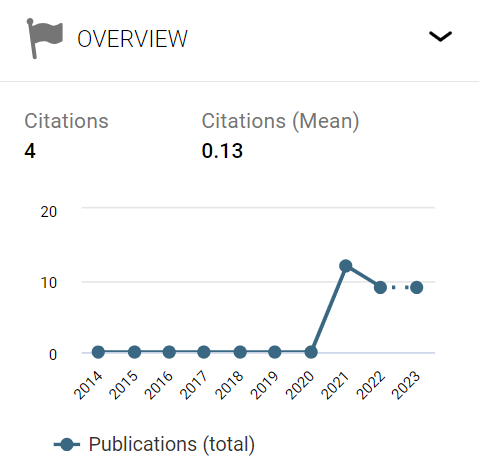Memimpin dengan Nilai-Nilai Pengajaran Yesus dalam Khotbah di Bukit: Sebuah Studi Implementasi Pada Pemimpin Gereja di Indonesia
DOI:
https://doi.org/10.52849/apokalupsis.v12i2.32Keywords:
Christian Leadership; Sermon on the Mount; Leadership Values; Leadership DevelopmentAbstract
Church Leaders are expected to have positive values in their life, not only in the church / ministry life, but also in the society or marketplace life, that is in family, work, business and so on. These leaders are expected to inspire the followers by imparting positive values through positive conducts and behaviors. The problems rise when the expectancy and the reality are not matched. This journal describes the Leadership Values model taught by Jesus through His sermon on the mount that includes 5 dimensions of life: spiritual, missional, relational, developmental and eternal. The implementation of this model is then studied on 565 church leaders in Indonesia as the population that come from different regions and denominations. Explanatory quantitative method through survey is used. The result shows that the church leaders often implemented the values, and the spiritual dimension is the dominant factor affecting their leadership values
References
Arifianto, Y. A. (2020). Peran Gembala Menanamkan Nilai Kerukunan dalam Masyarakat Majemuk. Voice Of Hamy Jurnal Teologi Dan Pendidikan Agama Kristen 3(1), p. 1-13. http://stthami.ac.id/ojs/index.php/hami
Bolker, B. M. (2003). Combining endogenous and exogenous spatial variability in analytical population models. Theoretical Population Biology, 64(3), p. 255-270. https://doi.org/10.1016/S0040-5809(03)00090-X
Bonifacio J. (2012). The Lego Principle. . Charisma House, p. 133-149.
Damazio F. (2013). Life Changing Leadership. Regal, p. 94.
Gunawan, A. (2020). Hamba Tuhan Dan Keluarga. Sola Gratia: Jurnal Teologi Biblika Dan Praktika, 3(1). p. 1-25 https://doi.org/10.47596/solagratia.v3i1.31
Kendrick M. (2015). Your Blueprint for Life. Thomas Nelson, p. 212.
Ko, C., Ma, J., Bartnik, R., Haney, M. H., & Kang, M. (2018). Ethical Leadership: An Integrative Review and Future Research Agenda. In Ethics and Behavior (Vol. 28, Issue 2), p. 104-132. https://doi.org/10.1080/10508422.2017.1318069
Koenig, H. G., & Langford, D. L. (2012). The Pastor’s Family: The Challenges of Family Life and Pastoral Responsibilities. Taylor & Francis, p. 1-5.
Lawson, D. (2009). Transforming Initiatives: Leadership Ethics from the Sermon on the Mount. Journal of Applied Christian Leadership, 3(1), p. 28-45.
Lina Miftahul Jannah & Bambang Prasetyo. (2016). Metode Penelitian Kuantitatif : Teori dan Aplikasi / Penulis. In Materi Pokok Metode Penelitian Kuantitatif, p. 43-44.
Maxwell, J. C. (2007). The 21 irrefutable laws of leadership : follow them and people will follow you. Thomas Nelson, Inc., c, p. 21.
Nugroho, S. (n.d.). Dasar-dasar Metode Statistika. Grasindo, p. 10.
Padondan, D. (2020). Implementasi Saat Teduh Terhadap Gaya Hidup Pendeta Masa Kini, p. 6.
Pardede, Zulkisar (2019). Rancangan Bangun Teologi “Kekudusan” Tentang Hamba Tuhan Sebagai Pemimpin Kristen Menurut Kitab Yosua. Kharismata: Jurnal Teologi Pentakosta 1(2). p. 100 – 117. https://doi.org/10.47167/kharis.v1i2.20
Patandean, Y. E., & Hermanto, B. W. (2019). Tema-Tema Theologis Khotbah Yesus Di Bukit Dalam Injil Matius 5:1-7:29. Evangelikal: Jurnal Teologi Injili Dan Pembinaan Warga Jemaat, 3(2), p. 123. https://doi.org/10.46445/ejti.v3i2.140
Raichur, A. (2014). The House Of God: Building Local Churches According To God’s Blueprint. All Peoples Church & Wordl Outreach, p. 172.
Ronny Kountur. (2005). Metode penelitian untuk penulisan skripsi dan tesis (Yustrianto, Ed.). PPM, p. 137.
Sasmoko. (2011). Penelitian Eksplanatori dan Konfirmatori. UKIP Sorong dan PT. Media Plus, p. 144.
Sasmoko, E. (2005). Metode Penelitian Pengukuran dan Analisis Data. Lippo Karawaci, Tangerang: HITS, p. 259-260.
Sugiyono. (2010). Metode penelitian administrasi / oleh Sugiyono. Koleksi Buku UPT Perpustakaan Universitas Negeri Malang, p. 11.
Taliwuna, M., Tampenawas, A. R. (2021). Peranan dan Sikap Hamba Tuhan Dalam Melaksanakan Misi Gereja Menurut Kisah Para Rasul 20:17-27. Jurnal Teologi Praktika, 2(1). p. 1-17 https://doi.org/10.51465/jtp.v2i1.19
Team B. (2017). Barna Trends 2018. Baker Books, p. 185.
Wagemans, J. (2004). Cognitive Psychology. In Encyclopedia of Social Measurement, p. 43-44. https://doi.org/10.1016/B0-12-369398-5/00480-1
Wheems, L. H. (2010). Church leadership : vision, team, culture, and integrity. Abingdon Press, p. 55-80.
Zega, Sabaria (2019). Pentingnya Memahami Entrepreneurship Secara Biblikal bagi Hamba Tuhan. Kharismata: Jurnal Teologi Pantekosta 1(2). p. 118-132. https://doi.org/10.47167/kharis.v1i2.16
Downloads
Published
How to Cite
Issue
Section
License

This work is licensed under a Creative Commons Attribution-ShareAlike 4.0 International License.









